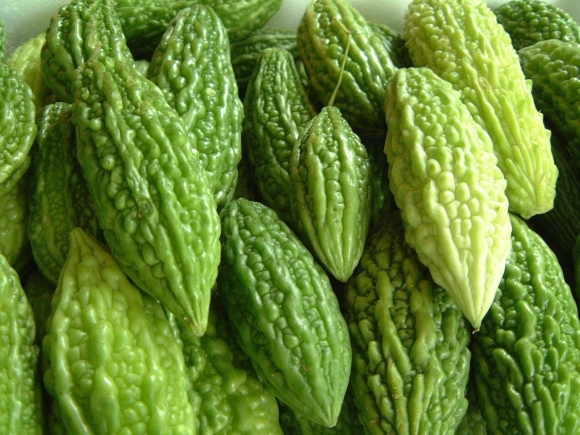Bitter melon
- In addition to being a food ingredient, bitter melon has also long been used as a herbal remedy for a range of ailments, including type 2 diabetes.The fruit contains at least three active substances with anti-diabetic properties, including charantin, which has been confirmed to have a blood glucose-lowering effect, vicine and an insulin-like compound known as polypeptide-p.
- These substances either work individually or together to help reduce blood sugar levels.
- It is also known that bitter melon contains a lectin that reduces blood glucose concentrations by acting on peripheral tissues and suppressing appetite – similar to the effects of insulin in the brain.
- This lectin is thought to be a major factor behind the hypoglycemic effect that develops after eating bitter melon
Cinnamon
- Cinnamon is a sweet but pungent spice that is derived from the inner bark of the branches of wild cinnamon trees, which grow in tropical areas across Southeast Asia, South America and the Caribbean.
- The use of cinnamon dates back thousands of years and was highly prized among many ancient civilisations.
- Cinnamon, often used in cooking and baking, is increasingly being linked to improvements in the treatment of conditions such as diabetes mellitus.
- Research has suggested that cinnamon can help to improve blood glucose levels and increase insulin sensitivity.
- As a result of the scientific evidence available, many health experts claim that cinnamon contains properties that are beneficial for blood sugar regulation and treatment of type 2 diabetes.
- However, bear in mind that like many natural compounds cinnamon is yet to be medically approved for prevention or treatment of any disease.
Fenugreek
- Multiple studies have been carried out to investigate the potential anti-diabetic benefits of fenugreek.
- Of these, several clinical trials showed that fenugreek seeds can improve most metabolic symptoms associated with both type 1 and type 2 diabetes in humans by lowering blood glucose levels and improvingglucose tolerance.
- In one study, researchers in India found that adding 100 grams of defatted fenugreek seed powder to the daily diet of patients with insulin-dependent (type 1) diabetes significantly reduced their fasting blood glucose levels, improved glucose tolerance and also lowered totalcholesterol, LDL or ‘bad’ cholesterol and triglycerides.
- In another controlled trial, incorporating 15 grams of powdered fenugreek seed into a meal eaten by people with type 2 diabetes reduced the rise in post-meal blood glucose, while a separate study found that taking 2.5 grams of fenugreek twice a day for three months lowered blood sugar levels in people with mild, but not severe, type 2 diabetes.



